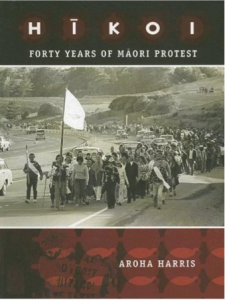At the end of our semester studying indigenous information issues, the TLAM class welcomed guest lecturer, Miranda Johnson to speak to us about Maori activism and biculturalism in New Zealand.
Johnso n is Assistant Professor in the departments of History and American Indian Studies at UW Madison. Her research interests focus on Indigenous history and policy, especially in New Zealand.
n is Assistant Professor in the departments of History and American Indian Studies at UW Madison. Her research interests focus on Indigenous history and policy, especially in New Zealand.
Like all guest speakers we’ve heard from, Miranda Johnson managed the impressive feat of relating years of history and policy within a very limited amount of time. In the hour we had with her, we discussed:
- Maori activism in the 1960’s and 70’s for land and language
- The role of the Treaty of Waitangi (link to Wikipedia: http://en.wikipedia.org/wiki/Treaty_of_Waitangi)
- Scholarly influences upon Maori activism: Ruth Ross
- Establishing biculturalism and bilingualism in the 1980’s
Throughout our discussion with Johnson, we were able to make connections with what we have been studying about and experiencing of Native American issues relating to information, language, and activism. It was enlightening to see how 1960’s and 70’s American Indian activism in the US inspired, and in turn was inspired by Maori activism in New Zealand.
We also saw other similar issues relating to land and language loss and continuing debates about Native sovereignty. Differences between the two countries’ native populations were striking as well. In a smaller country where the indigenous population speaks the same native language, biculturalism has taken great strides. It is especially inspiring to see the effects of language revitalization and the role that libraries have played in this.
In our discussion with Miranda Johnson, we also learned that despite the strides taken in the 1980’s and ‘90’s, there is still political pushback against this ideal of biculturalism. She also raised the point of how biculturalism should not take the place of multiculturalism as New Zealand sees greater immigration from other countries.
The TLAM class thanks Professor Johnson for providing us with this global scope of indigenous activism, how it relates to libraries and information issues, and what we can do as librarians and cultural heritage professionals to best serve indigenous people and communities.
Articles by Miranda Johnson:
2008 ‘Making History Public: Indigenous Claims to Settler States,’ Public Culture 20.1: 97-117
2005 ‘Honest Acts and Dangerous Supplements: Indigenous Oral History and Historical Practice in Settler Societies,’ Postcolonial Studies, 8, 3: 261-76
2005 ‘ “The Land of the Wrong White Crowd”: anti-racist organizations and Pakeha
identity politics in the 1970s,’ New Zealand Journal of History, 39, 2: 137-57
2000 ‘Chinese Civil Society: a case of failure or scholarly obfuscation?’
New Zealand Journal of Asian Studies, II, 2: 107-35
Further Reading about Maori Libraries:
Te Ara Tika: Maori and Libraries in New Zealand – Staying the Distance. Szekely, C. (2002). World Libraries 12(1).
